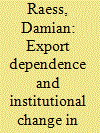| Srl | Item |
| 1 |
ID:
137511


|
|
|
|
|
| Summary/Abstract |
The developing field of Islamic chaplaincy consists of an emergent group of religious authorities in the American Muslim community engaging in a dynamic, sometimes ambiguous, professional field. We demonstrate how prison chaplains provide religious accommodation, advocacy for civil rights, and potentially rehabilitative services to incarcerated Muslims; Muslim hospital chaplains provide service to hospitalized patients regardless of faith tradition, though the lack of adequately Clinical Pastoral Education (CPE)-trained Muslims inhibits expansion; Muslim military chaplains struggle with suspicion from homeland security agencies, while their endorsing bodies are inadequately developed for training and support; and Muslim college chaplains nurture students in a variety of settings, though often without adequate funding models. This research brings disparate streams of scholarship together to provide a benchmark for the future development of Islamic chaplaincy in the USA.
|
|
|
|
|
|
|
|
|
|
|
|
|
|
|
|
| 2 |
ID:
133646


|
|
|
|
|
| Publication |
2014.
|
| Summary/Abstract |
This article explores the adjustment of wage bargaining institutions to international trade in Germany. Embracing IPE as opposed to CPE lenses yields a novel interpretation of change in the institution of wage bargaining. Export dependence of a sector, we argue, has destabilizing effects for industry-wide bargaining by sparking an intra-sectoral cleavage between domestic- and export-oriented enterprises. Specifically, the greater the degree of export dependence of a sector, the greater the degree to which domestic-oriented enterprises within that sector will abandon collective bargaining. We also explain how workplace employee representation through works councils mitigates this effect, such that the presence of works councils helps domestically oriented firms to hold to collective bargaining agreements in the face of a sector's deepening exposure to export markets. These claims find empirical support in the history of labor relations developments in the metal industry and, especially, in extensive analysis of a cross-section of establishments. Our findings attribute major responsibility to the firms driving globalization for undermining collective bargaining institutions and suggest that economic globalization is a cause of dualization. In all, the article provides fresh ammunition for a version of globalization-induced institutional convergence. [Correction added after online publication on May 28, 2014: "conversion" changed to "convergence" in preceding sentence.]
|
|
|
|
|
|
|
|
|
|
|
|
|
|
|
|